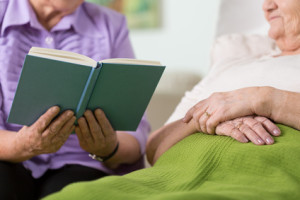
Update: In the years since I wrote this, I’ve realized that “elderly” can be seen as an ageist term. I now know that “older adult” is a better term. Still, the fact remains that people find these posts almost daily, years later, because they’re searching for “reading aloud to the elderly.” So I’m leaving the title intact, but highlighting the fact that these days, our terminology differs.
Imagine yourself in your late 80s or early 90s. Perhaps you’re in a nursing home, or you still live in your own house or apartment, but you’re not able to get out easily, and people don’t come by to visit as often as they used to. You know people are busy. That’s the way of the world these days.
You pick up your favorite book, but it seems heavier than it used to be, and the words are smaller, too. They dance in front of your eyes. You squeeze your eyes shut and then try again, but the words are just too hard to make out. You set the book aside, and look out the window. There’s not much else to do.
Then someone, a kind neighbor, or your grandson, or a good friend comes in. They smile and say, “I saw this story in a magazine and knew that you’d enjoy it.” Instead of just handing it to you, they read it to you. You don’t have to worry about dancing words, and you have the added bonus of their enjoyment of the article as well.
Or you’re in the nursing home, and you waken at night, fearful for some reason. You’re not sure where you are, and nothing looks familiar. You try to get out of bed, but there is a barrier on the side.
Someone comes in — you vaguely remember that he’s a nurse — and sits by your bed, turns on a little light, and starts reading poetry to you. They’re poems you learned as a child at school, and the memory makes you smile. You drift off to sleep as he reads.
Reading aloud can bring so many benefits to elderly people. It can
- inform
- entertain
- alleviate anxiety
- alleviate boredom
- alleviate a sense of being isolated
- provide a connection with others
- provide a topic of conversation
- enhance visits in which neither person knows how to proceed
- enhance self-worth, when the elderly person realizes someone cares enough to read to them
Some elderly people have the desire to read as they have always done, but the ability to do so has eroded over the years.
- Their vision may not be as acute (and print in books is generally tiny, as is that in magazines).
- They may not have the physical strength to hold a large-print book for long. (Try it some time. They’re heavy!)
- Their cognitive abilities may have dwindled, making understanding the printed word more difficult.
- They may be dealing with dementia, which complicates many aspects of the reading process.
Reading aloud can answer so many challenges that elderly people face. The Reader Organization in the UK has found that using their shared reading model with people with dementia “shows
- improved mood
- improved concentration
- improved recollection
- greater levels of social interaction”
An article in The Lancet, by Carolyn Banks, a strong advocate for reading aloud to the elderly, states that “to most of the people, the act of reading itself had a soothing effect.” She also found that “Being read to … seems to be as welcome as a touch, whether or not the listeners had been readers or the words have literal meaning any longer.”
In my own experience, I have known the power of reading aloud — even over the phone — to help my mother’s anxiety when she was first in a nursing home. I know that the written word could soothe her, and that she loved to be read to, as well as to read on her own as long as she was able.
I have seen my father’s dwindling ability to read for himself, due partly to hand tremors shaking the magazine so that his eyes could not focus, and partly to diminishing cognitive ability due to dementia. And I learned, after he died, that often at night one of the nurses would read to him to ease the restlessness and anxiety that were a part of his Sundowner’s Syndrome.
I believe very strongly that reading aloud enhances the lives of the elderly, and I hope that this post has helped show you why this is so important.
Throughout this blogging year, on the last Monday of the month, I will be exploring various aspects of the topic of reading aloud to the elderly. I first blogged about this topic several years ago in a post which you may read here. In fact, it is the ongoing popularity of that post that inspired me to write this series.
I look forward to delving more deeply into this as the months go on. Please join me on this journey through the why, what, where, when, who and how of reading to the elderly. On October 26th, I’ll make suggestions about how to read to the elderly.
EDITED TO SAY: Because of a question that was asked in the comments, I’m going to change the post schedule around a bit, and deal with WHAT to read to the elderly in the next two posts. HOW will be covered in January.
Do you have experiences of reading to or with elderly people? I hope you’ll share your thoughts and experiences in the comments.

Hi Beth, what a thoughtful post. It is frightening how reading can become so difficult as we grow older. This is a really good thing to raise awareness about.
Thanks, Niamh! It’s a topic close to my heart.
I have seen this first hand with my 86 year old mother. She loved to read and can´t any more. We have hired someone to come in and read to her twice a week and she loves it. A wonderful post. It is so good to make everyone aware.
I’m so glad you’ve found someone to read to your mother. It will make such a positive difference in her life!
Great introductory post! 🙂
Thanks, Erik!
Thank you so much for your post on this topic. I am the coordinator for a children’s local missions program at my church and reading to assisted living center residents is something that was laid on my heart to pursue as a service project. Is there a particular book or type of book that you can recommend for children to read to them?
Hi, Kelli — Thanks for reading my post. I’m so glad that you’ve decided to pursue reading to the elderly as your kids’ service project. What an excellent project!
I’m planning to do a couple of posts on “what” to read to the elderly, and thanks to your question, I’ve bumped them up in the schedule. Instead of “How” on the last Monday of October, I’ll cover “What” in October and November. And I’ll look for recommendations of things for kids to read to them, and include that in the October post. I hope that will help!
My granddaughter read Old Yeller to my 86 year old mom and she loved it. I think the old classics from when they were younger would be perfect. Little House on the Prairies etc. The kids and the seniors would benefit. A great project!
Pingback: WHAT to Read Aloud to the Elderly — Part Two in the Series | By Word of Beth
Pingback: Reading Aloud to the Elderly — revisited | By Word of Beth